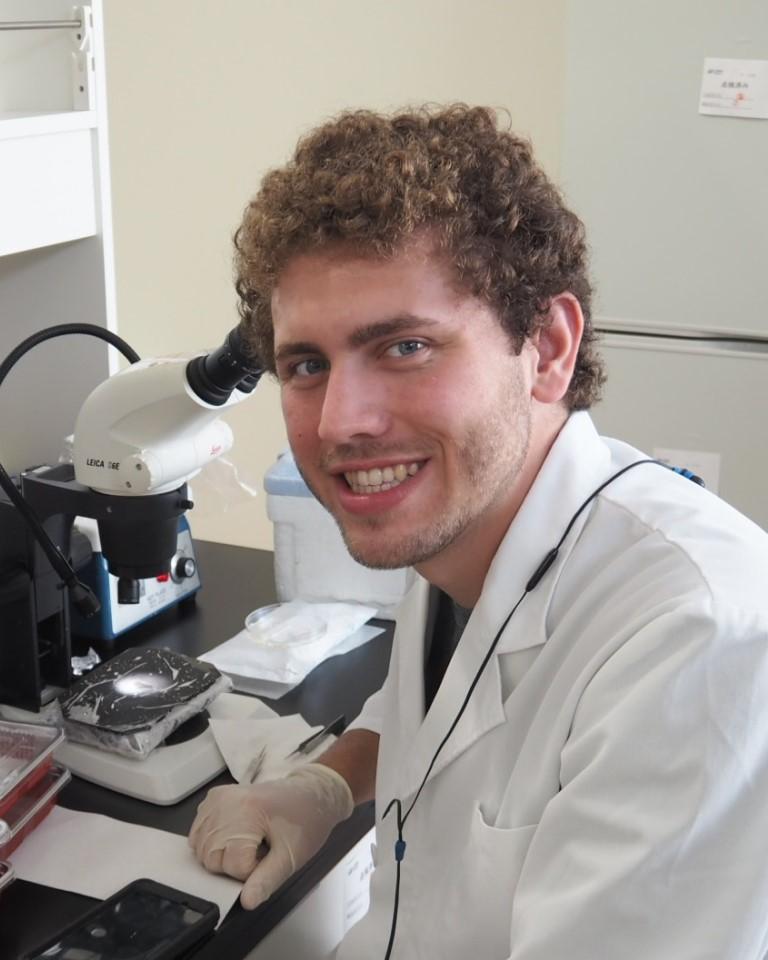Andrew Mongue

MENTOR SPOTLIGHT | SEPTEMBER 2018
Department: Ecology and Evolutionary Biology
Describe your work in a few sentences that we can all understand: As important as reproduction is, we don’t fully understand many of the processes that take place between mating and the development of embryos. I study reproductive biology from an evolutionary perspective: asking how different systems function and why they are organized the way they are. In particular, I am trying to understand why butterflies and moths make both “normal” sperm and a type that lacks DNA and can’t fertilize eggs. From a simplified point-of-view, sperm without DNA seem to be pointless, as the sole job of sperm is to transport a male’s DNA to a female’s eggs. Yet experiments suggest these non-fertilizing sperm play some role in successful matings. I hope by determining the function of non-fertilizing sperm, we can gain a better understanding of the complex interactions that take place during reproduction.
Q: How did you first get interested in doing research or creative work?
A: I’ve had a passion for science my whole life, but it was my high school Biology teacher who first suggested that I volunteer at a university research lab for hands-on experience. We all get an impression of what an experiment is from science classes early on, but to me there is something inherently different about working on a formal research project. I was immediately struck by the idea that the results of the project, whether they supported our initial hypothesis or not, whether they had profound implications or not, would be completely new knowledge. I’ve been hooked on that quest for new discoveries ever since.
Q: What do students in your discipline learn by doing research that they wouldn’t learn by just taking classes?
A: First and foremost, there’s a perspective that comes with doing research yourself. In class, you’re taught the ultimate result of an experiment, but it’s hard to appreciate how many factors go into getting that result. Everything from good time management and organization to sheer luck plays a role in successful experiments. Another really fun part about doing research is getting to use the latest technology. Lab classes tend to use established methods that produce very consistent results. A lot of research, on the other hand, employs newer technologies and cutting-edge methods. It’s hard not to get excited about things like a portable genome sequencer that fits in the palm of your hand (which we have in our lab)!
Q: What do you find to be the most exciting part of doing research or creative work? What makes this line of work meaningful and interesting to you?
A: I’ve already mentioned the excitement of discovering something completely new. The other big upside to research is applying creative approaches to problem solving. Working on new discoveries means that there is no sure-fire method to answer a question. I’ve done live insect experiments in the lab, gone across the country to collect specimens in the wild, and worked some days from my couch at home using KU’s computing cluster. It’s impossible to get bored when you’re changing up your routine so much. I can’t really think of another career that offers this much freedom and flexibility.
Q: What advice do you have for undergraduates interested in doing research in your field?
A: First, get in a lab now and start getting experience! It’s probably obvious, but that’s the best way of determining if research is right for you. Other than that, if you are an aspiring scientist, take some coding classes. I wish someone had told me this when I was an undergraduate. Science classes will teach you the theory and lab classes will teach you the experimental practice, but there’s a whole separate skill set in analyzing your results. Genomics work in particular requires coding know-how to handle the software tools and massive datasets involved. I spent my first year of graduate school learning how to script for cluster computing; having better coding skills going in would’ve saved me a lot of time and frustration.
Q: For many students, doing research or a larger creative project is the first time they have done work that routinely involves setbacks and the need to troubleshoot problems. Can you tell us about a time that your research didn’t go as expected? Or about any tricks or habits that you’ve developed to help you stay resilient in the face of obstacles?
A: Stumbling blocks and setbacks go hand-in-hand with working on something new. I’ve been troubleshooting a side project trying to sequence the genome of a butterfly parasite for about a year now, but I think I’ll only feel defeated if I run out of ideas for how to solve the problem. I’ve learned to reach out to other researchers for everything from new protocol ideas to commiseration. Setbacks are ubiquitous in science, so it’s an experience to which everyone can relate. Others have felt the same frustrations you have and can offer sympathies and perspective to keep you motivated to go forward.
Q: How do you spend your time outside of work?
A: A lot of my work involves analyzing data or writing on a computer, so I try to step away from the computer screen in my down time. I love photography and use it as a way to get outside and engage a different kind of creativity than I do in my research. I also find exercise to be a great stress reliever and I’m currently training for a marathon.